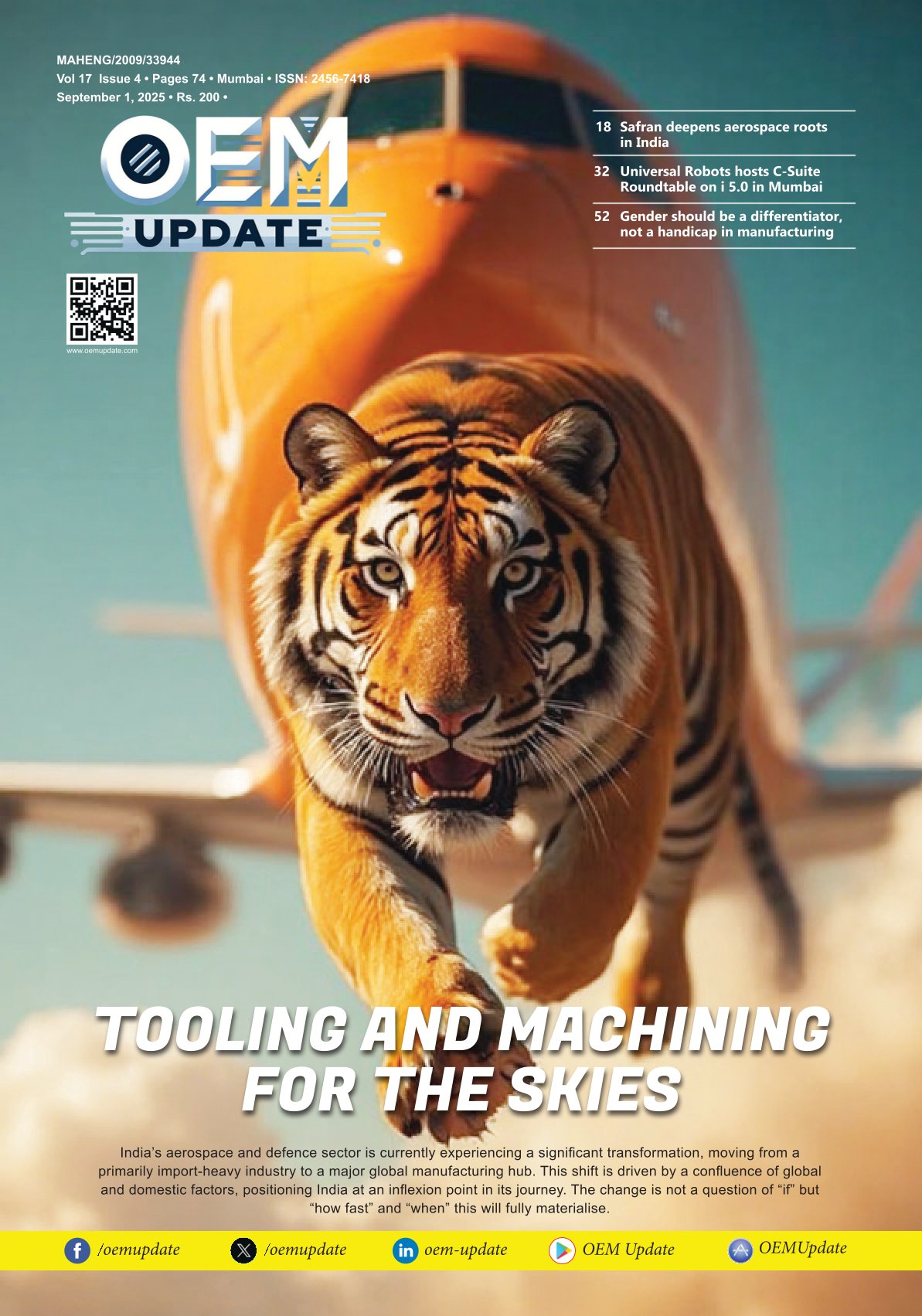Robotic automation provides cost-effective alternatives
By OEM Update Editorial June 5, 2024 6:50 pm IST
S. Nagasubramanian, CEO of Enlightened Thought Works, emphasises the role of manufacturing robots. Excelling in repetitive tasks, they ensure speed, precision, and durability, offering cost-effective solutions and bridging skill gaps for sustained global competitiveness.
How can manufacturers leverage automation technology and TQM principles to scale up manufacturing?
Automation technology conforming to Industry 4.0 standards replaces manual labour, enhancing precision and efficiency while minimising errors. Robots, automated assembly lines, and similar technologies optimise manufacturing processes, reducing costs and lead times. This shift allows employees to focus on complex, creative tasks, supported by appropriate training. Meanwhile, adherence to Lean Manufacturing principles ensures quality while streamlining processes, cutting waste, and boosting productivity. Solar energy adoption and efficient resource management further trim costs and enhance sustainability. Leveraging outsourcing, rental models, remote work, and sustainable materials strengthens competitiveness through improved supply chain efficiency and reduced environmental impact.
Implementing the five pillars of Total Quality Management (TQM) – Product, Process, Organisation, Leadership, and Commitment – borrowed from Japanese practices- ensures cost-efficiency improvement (CEI). This approach enables the retention of sufficient resources through internal funds and reinvestment during the transition to automation, which demands significant technological investment.
How do manufacturing robots contribute to improving productivity in modern manufacturing operations?
Manufacturing robots serve various functions, especially in repetitive high-volume tasks where they excel in speed, precision, and durability with zero defects. Their assistance in heavy lifting and movement optimises operations. Robotic automation sustains international competitiveness, providing cost-effective alternatives to offshoring and filling skill gaps. Robots enhance worker satisfaction and safety by freeing up labour for creative and dynamic tasks and fostering dedicated production solutions. Additionally, they mitigate dull, unhealthy tasks, allowing staff to focus on roles like engineering and administration, ultimately increasing business efficiency and competitiveness. Moreover, robots contribute to resource conservation and cleaner environments, aligning with the imperative of green manufacturing.
How does Industry 4.0 impact manufacturing operations in India?
Industry 4.0, guided by the Internet of Things, orchestrates automated development systems where interconnected objects, equipment, and computers facilitate simple communication. Robots are centrally controlled, executing tasks intelligently with real-time feedback and reporting. Autonomous mobile robots navigate plant floors, coordinate with peers, and respond to real-time needs. This connectivity, vital for advanced machinery, redefines traditional machine interactions. For instance, doors now interact with mobile robots, enabling automated material transfer. Additionally, robots facilitate wireless communication for elevator operation, even integrating with emergency systems for comprehensive plant management.
How do we address challenges posed by outdated IT systems when integrating Industry 4.0 technologies?
Manufacturers with outdated IT systems may need help integrating new software for production data analysis, necessitating time-consuming retrofits. Before establishing smart factories or retrofitting existing ones with Industry 4.0 tech, groundwork in IT infrastructure is essential. It includes assessing business management systems across departments like R&D, procurement, and supply chain. Collaborative efforts between IT departments and other divisions/plants are crucial to addressing technology implications comprehensively.
Many factories operate a mix of old and new equipment needing sensors and internet connectivity, making retrofitting impractical. Integration software can bridge data sources facilitated by decreasing sensor costs and standardised protocols. Investing in compatible IoT systems and ERP software streamlines production planning and execution, enabling connected manufacturing.
However, technological compatibility and investment constraints hinder scaling Industry 4.0 initiatives beyond pilot phases. Adopting a minimum viable product approach allows for incremental implementation, leveraging user feedback to refine projects and optimise spending, thereby overcoming obstacles to broader adoption.
How can manufacturers effectively address the workforce skill gap?
Addressing the Workforce Skill Gap is crucial for implementing Industry 4.0. Manufacturers face challenges attracting and retraining talent to integrate digital systems into production. Workers need training to operate touch screens and tablets, analyse data, and optimise processes. Machine operators are transformed into Digital Manufacturing Forces, empowered to control machines digitally. On-the-job training is essential, as engineers also need instruction in analytical techniques. Hiring for technical roles like robotics specialists is necessary for success.
How can manufacturers ensure the implementation and sustainability of Industry 4.0 initiatives?
Industry 4.0 transcends the shop floor, necessitating a holistic understanding across departments for successful pilots and broader implementation. This demands a departure from traditional processes, requiring structured interactive sessions to shift mindsets and prioritise sustainable technology investments. Digital technologies continually innovate and change much at a faster pace. Hence, a judicious approach to acquisition and internal controls is crucial to prevent obsolescence and ensure cybersecurity. Manufacturers should focus on use cases and sites delivering quick wins and financial returns to demonstrate the value of Industry 4.0, facilitating change management and employee adoption. These factors will eventually ensure the sustainability of Industry 4.0 initiatives.
Please talk about the advantages of the Make in India initiative for scaling up manufacturing.
The Make in India initiative offers numerous advantages for scaling up manufacturing. The initiative boosts manufacturing by reducing imports, promoting exports, creating jobs, and strengthening the economy. It attracts foreign investment, elevates the value of the Indian currency, and drives a vertical jump in GDP growth. This initiative will position India as a formidable player in the global manufacturing landscape.
Cookie Consent
We use cookies to personalize your experience. By continuing to visit this website you agree to our Terms & Conditions, Privacy Policy and Cookie Policy.
















